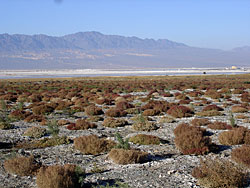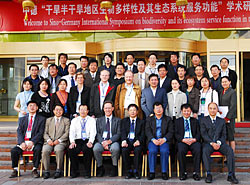Press relase, November 7th 2006
New concepts for ecological use of drylands
German and Chinese researchers searching for solutions
Beijing/Leipzig. German and Chinese scientists agreed to work closely together to combat ecological problems in the arid areas of North-West China. The establishment of a Sino-German Dryland Research Centre in Beijing will be an important step to achieve the joint scientific goals . This plan was announced by scientists from the Agricultural University in Urumqi, Beijing Forestry University, the Universities of Bielefeld, Halle, Hohenheim and Marburg and the Centre for Environmental Research Leipzig-Halle (UFZ) at a Sino-German symposium in Urumqi in October 2006. The focus of the symposium, which was supported by the Sino-German Centre for Research Promotion (CDZ), was on issues of biodiversity in arid areas. Declining biodiversity and the loss of stable ecosystems play an important role in desertification.

Salty areas in the Chinese Taklamakan desert
Source: Dr. Jürgen Groeneveld/UFZ

Participants of the Sino-German symposium in Urumqi in October 2006.
Source: Maik Veste/Universität Hohenheim
Desertification and global environmental change are threatening biodiversity and the balance of the countryside, especially at the desert fringes.
Inappropriate land use, over-grazing and clearing (e.g. in oases, in wooded strips fed by ground-water, in wadis and gallery forests and in dry savannah
regions), over-use of soil and water resources lead to degradation of the landscape and to the loss of what was already a very poor biological production
basis, and to a decline in species diversity, or biodiversity. The importance of biodiversity for ecosystem functions must be given greater prominence in
future rehabilitation measures. The conservation or development of biodiversity in drylands contributes towards the development of stable ecosystems in the
long term. Location-specific measures for biodiversity development should be taken into account in plans to combat desertification. “However, this requires
fundamental knowledge of the existing biodiversity in the various arid ecosystems and its function in the ecosystems”, stresses Maik Veste of the University
of Hohenheim, “because stable ecosystems and sustainable land and resource use are the key to China’s future environmental development”.
The scientific research will focus on the Urumqi region and Inner Mongolia. The city of Urumqi is in North-West China and, with around two million inhabitants,
is the furthest from the sea of all the world’s cities. Like all Chinese cities, Urumqi is growing rapidly, despite being situated in an arid area affected by
desertification. This megacity is on the edge of the Taklamakan Desert and was once part of the old Silk Road.
Scientific cooperation between Chinese and German institutes in the field of dryland research is to be increased. This was agreed by the scientists present. Key
topics to be covered in future projects are the ecology of arid areas, natural resource management, combating desertification and the conservation of
biodiversity. “We already have experience of modelling arid areas and forests”, explains Dr. Jürgen Groeneveld of the UFZ. “We could use this experience to
support the reafforestation projects in China.” But new, innovative use concepts, like energy farms and bioenergy, are also being discussed. Exchanges involving
students, researchers and teaching staff are to be promoted, as well as joint projects on the ecology of arid areas in the broadest sense, including applied
aspects. In future, these activities will be coordinated by a newly formed joint dryland research centre in Beijing.
Dryland research
Further information:
Maik Veste
Sino-German Dryland Reseach Center
e-mail: veste@drylandreseach.de
or
Dr. Jürgen Groeneveld
Helmholtz Centre for Environmental Research – UFZ
phone +49 341 235-2695
www.ufz.de/index.php?de=3830
or
Doris Böhme / Tilo Arnhold,
Public Relations of Helmholtz Centre for Environmental Research – UFZ
Phone: +49-341-235-2278
e-mail: presse@ufz.de
